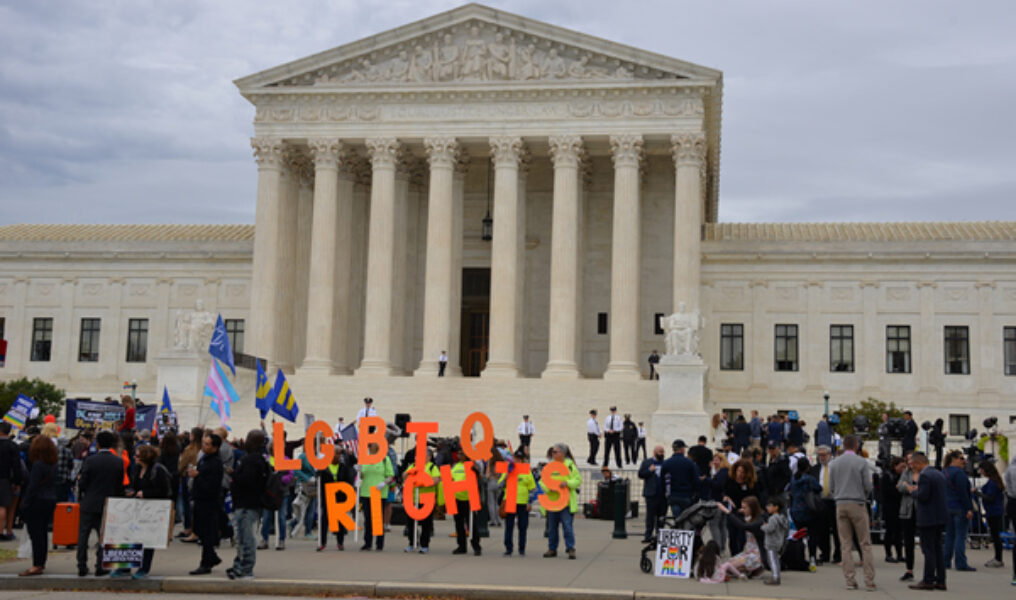In a historic development, the U.S. Supreme Court ruled on Monday federal law bars discrimination against workers for being LGBTQ, affirming long-sought federal protections for LGBTQ people in the workplace.
The 6-3 decision, written by U.S. Associate Justice Neil Gorsuch, determines anti-LGBTQ discrimination is a form of sex discrimination, thus prohibited under Title VII of the Civil Rights Act of 1964.
"An employer who fires an individual for being homosexual or transgender fires that person for traits or actions it would not have questioned in members of a different sex," Gorsuch writes. "Sex plays a necessary and undisguisable role in the decision, exactly what Title VII forbids."
Joining Gorsuch in the majority was U.S Chief Justice John Roberts as well as U.S. Associate Justices Ruth Bader Ginsburg, Elena Kagan, Sonia Sotomayor and Stephen Breyer.
Dissenting were U.S. Associate Justices Brett Kavanaugh, Samuel Alito and Clarence Thomas.
The decision was issued in three consolidated cases, Bostock v. Clayton County and Zarda v. Altitude Express, which sought to clarify whether anti-gay discrimination is a form of sex discrimination, and Harris Funeral Homes v. EEOC, which sought to clarify whether anti-trans discrimination was sex discrimination.
The transgender worker in the Harris case, Aimee Stephens, a funeral home director, passed away last month before she could learn of the decision to come from the Supreme Court. The gay worker in the Zarda case, Donald Zarda, a skydiver, had passed away before his case reached the Supreme Court. The gay worker in the Bostock case, Gerald Bostock, is still living.
In each of these cases, LGBTQ workers argued they were unlawfully filed because of their sexual orientation, but the employers that was perfectly legal because no federal law explicitly bans anti-LGBTQ discrimination.
Although employers argued before the Supreme Court Congress didn't have to include LGBTQ people when it enacted the Civil Rights Act of 1964, Gorsuch throws cold water on that argument.
"The employers assert 'no one' in 1964 or for some time after would have anticipated today's result," Gorsuch writes. "But is that really true? Not long after the law's passage, gay and transgender employees began filing Title VII complaints, so at least some people foresaw this potential application."
Gorsuch cites several cases establishing precedent on the scope of Title VII to reach the conclusion to bars anti-LGBTQ discrimination. Among them is the 1998 decision in Oncale v. Sundowner Offshore Services, Inc. — a decision written by the late U.S. Associate Justice Antonia Scalia that determined sexual harassment from same-sex workers amounts to sex discrimination under the law.
The ruling doesn't merely uphold the status quo, despite the widespread misconception anti-LGBTQ discrimination is already illegal. For the 29 states that lack state laws banning anti-LGBTQ discrimination in the workforce, the ruling affirms discrimination based on sexual orientation and gender identity in the workplace is now illegal in those places and nationwide.
In terms of federal law, the decision dramatically expands civil rights protections by assuring Title VII prohibits discrimination against LGBTQ people.
Only two federal judicial circuits — the 2nd and the 7th — had previously determined anti-gay discrimination is sex discrimination. The idea anti-trans discrimination is a form of sex discrimination is more established in the U.S. jurisprudence, but the Supreme Court ruling now guarantees those protections nationwide.
LGBTQ rights advocates, many of whom had been fighting for decades to win LGBTQ non-discrimination protections at the federal level, hailed the Supreme Court ruling as a historic milestone.
Tico Almeida, an attorney at WilmerHale who represented more than 200 businesses – including Apple, Facebook, Google, Univision, and Warner Media – in an amicus brief supporting the LGBTQ workers, said the decision "affirms the legal protections that give LGBTQ Americans the freedom to work without discrimination."
"The major businesses that signed our pro-LGBTQ amicus brief to the Supreme Court employ millions of workers, comprise over $5 trillion in revenue, and share a common interest in equality because they know that ending discrimination in the workplace is good for the U.S. economy as a whole," Almeida said.
Shanon Minter, a transgender civil rights attorney and legal director for the National Center for Lesbian Rights, said the ruling comes at an appropriate time for the nation.
"This is a huge victory not just for LGBTQ people, but for our country, which benefits enormously when LGBTQ people are permitted to participate and contribute on equal terms," Minter said. "Today's decision will be remembered as a watershed in the history of LGBTQ rights, even as our country continues to grapple with the brutal legacy of racism."
The Trump administration, through U.S. Solicitor General Noel Francisco, argued before justices firing workers for being LGBTQ is permitted under Title VII.
It remains be to seen how the Trump administration will implement the decision now that the court has ruled the other way. The White House and Justice Department didn't immediately respond to the Washington Blade's request to comment.
More to come…
This article originally appeared in the Washington Blade and is made available in partnership with the National LGBT Media Association.










